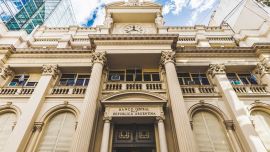With more than 1,800 confirmed cases in the country to date, the coronavirus pandemic has prompted an unprecedented nationwide shutdown that has seen Argentina’s economy grind to a near-halt.
The shutdown, ordered by President Alberto Fernández in a bid to halt the spread of the virus, is expected to come at a heavy price, with GDP expected to contract by as high as six percent this year, according to some experts. Such a development would have across-the-board implications for many sectors and delay any recovery for the country, which has been in recession for two years.
The outbreak arrived at what was already a difficult moment for the Fernández administration, which is grappling with a debt restructuring process that has left Argentina on the verge of a new sovereign default. A formal offer for foreign creditors is imminent, while payments for local creditors have been pushed back until next year.
Eduardo Levy Yeyati, a founding partner of the Elypsis consultancy firm and dean of the School of Government at the Di Tella University in Buenos Aires, tells the Times about the impact the crisis has had to date – and explains why the real costs of the crisis are yet to be seen.
Economic expectations for Argentina this year were already negative before the coronavirus pandemic arrived. Now, with numerous productive sectors on hold, and with a further economic contraction expected, what can Argentina aspire to within this new context?
It is still too early to tell. Our first, already three-weeks old projection assumed the economic impact of the lockdown to be about three percent of GDP, but losses would be larger if the lockdown is extended, as it seems to be the case. A five to six percent contraction in GDP this year is a realistic base case.
The government took a series of measures to promote the sectors most affected by the quarantine and reduce the effects of the coronavirus. What did you think of them?
The measures are a mixed bag. Some of them, such as the subsidised investment and construction loans, are Keynesian in nature and have limited impact during a lockdown that severely restricts activity, although they may be useful to speed up the recovery the day after. Labour and income protection measures make more sense, although the instruments are biased. For example, employment subsidies (REPROs] and unemployment insurance benefit formal salaried workers, but leave out independent and informal workers. Subsidised loans go to the 10 percent of mostly large companies with a credit track record, leaving the majority of SMEs unattended. Cash transfers [IFE] are a natural way to place an income floor for low-income households.
Various productive sectors have called on the government to lift the quarantine as soon as possible, or at least make it more flexible, a debate that the government took as health versus the economy. Such debates have also been replicated in other countries in the region. Should quarantine be further segmented and extended?
It will be segmented de facto, because a full lockdown has economic losses that also grow exponentially, and these could easily translate into human losses over time. The dilemma is not between health and the economy, but rather between lives and lives.
The government may be tempted to extend the lockdown for two reasons: the first one is uncertainty about the probability of another peak down the road – the dilemma here would be between a lockdown today or tomorrow, particularly since Argentina seems to be behind the curve in terms of the State’s capacity to face a peak and to control the virus under a [social] distancing approach; the second reason is political – if the lockdown was lifted, the health impact would be attributed to the government. The blame for the economic consequences of the quarantine is more diffuse.
The lockdown forced a transition to remote work for many Argentine companies, in many cases by force as people had to stay at home. Will everything that has happened speed up the expansion of this way of working in the country?
I think that after the quarantine everybody would like to go back to the office. Over time though, there may be a change in the mix between office and home in activities where the online mode proved to work well.
I also expect the remote technology and connectivity to improve, based on the lessons from this massive dress rehearsal.
The coronavirus arrived a few months after Alberto Fernández took office, acting mostly aligned with opposition forces in the face of the crisis. What does this crisis mean politically for the government?
A crisis of this magnitude is a two-sided knife. On the one hand, it presents a unified external threat that helps whoever is in charge to gather broad support – something that Fernández is profiting from and this is showing in the polls. On the other hand, it leaves a sour aftertaste; there are no magic bullets, the economy will suffer, and we are only just starting to perceive those costs just now. [Winston] Churchill won the war but not the election.
At the same time, the government is also continuing negotiations with foreign creditors, with a formal offer expected in the coming weeks. What expectations do you have regarding this process and the characteristics of the offer?
I expect the offer to follow the guidelines expressed by [Economy] Minister [Martín] Guzmán in the past few weeks.
I believe it will be difficult, in the current context, to define a financial programme and design an offer that meets both the minister’s and the creditors’ demands. Because of that, I think the best realistic option to avoid a default would be a standstill-like agreement to postpone the servicing of debt for a few years, with the view to a future restructuring when there is more clarity about the economic context and what the country can afford to pay.
If the first offer fails, this standstill would be a reasonable second-best [option].



















Comments